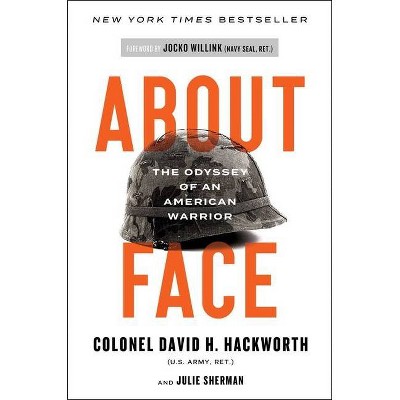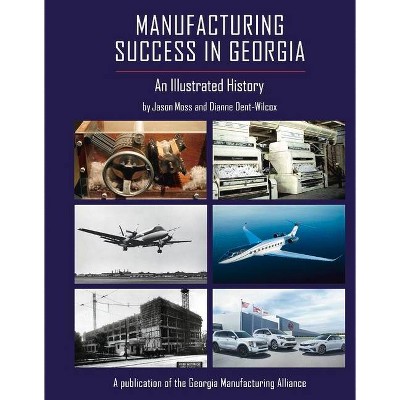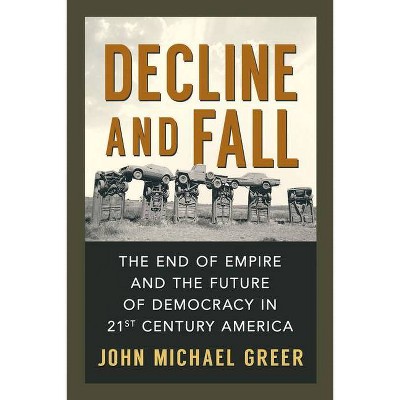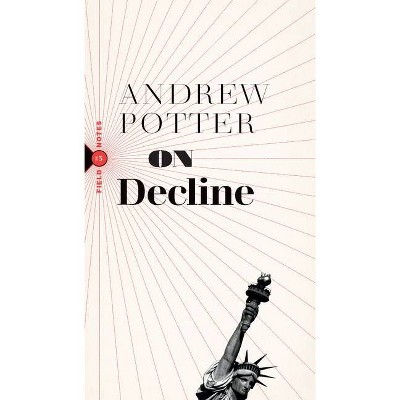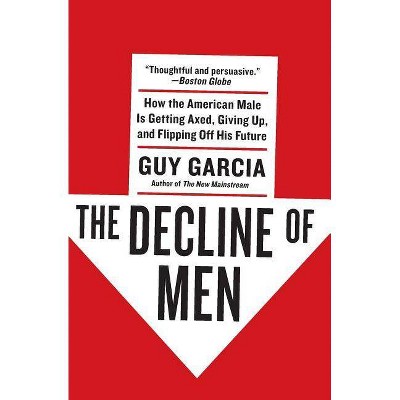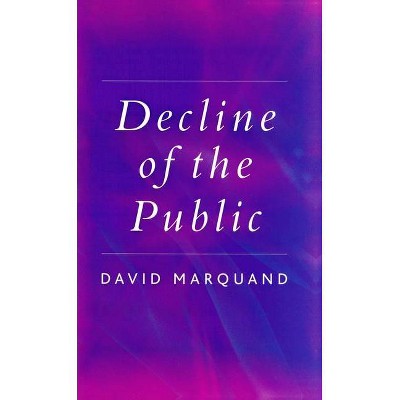Manufacturing Decline - by Jason Hackworth (Paperback)
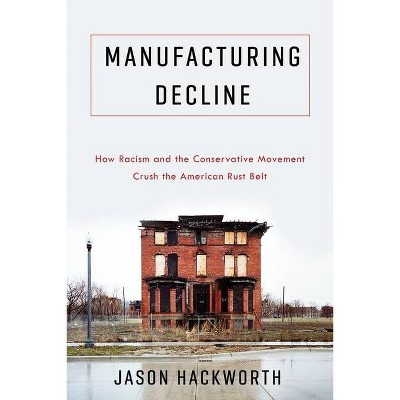
Similar Products
Products of same category from the store
AllProduct info
<p/><br></br><p><b> About the Book </b></p></br></br><i>Manufacturing Decline</i> argues that antigovernment conservatives capitalized on--and perpetuated--Rust Belt cities' misfortunes by stoking racial resentment. Jason Hackworth traces how the conservative movement has used the imagery and ideas of urban decline since the 1970s to advance their cause.<p/><br></br><p><b> Book Synopsis </b></p></br></br>For decades, the distressed cities of the Rust Belt have been symbols of deindustrialization and postindustrial decay, their troubles cast as the inevitable outcome of economic change. The debate about why the fortunes of cities such as Detroit have fallen looms large over questions of social policy. In <i>Manufacturing Decline</i>, Jason Hackworth offers a powerful critique of the role of Rust Belt cities in American political discourse, arguing that antigovernment conservatives capitalized on--and perpetuated--these cities' misfortunes by stoking racial resentment. <p/>Hackworth traces how the conservative movement has used the imagery and ideas of urban decline since the 1970s to advance their cause. Through a comparative study of shrinking Rust Belt cities, he argues that the rhetoric of the troubled "inner city" has served as a proxy for other social conflicts around race and class. In particular, conservatives have used images of urban decay to craft "dog-whistle" messages to racially resentful whites, garnering votes for the Republican Party and helping justify limits on local autonomy in distressed cities. The othering of predominantly black industrial cities has served as the basis for disinvestment and deprivation that exacerbated the flight of people and capital. Decline, Hackworth contends, was manufactured both literally and rhetorically in an effort to advance austerity and punitive policies. Weaving together analyses of urban policy, movement conservatism, and market fundamentalism, <i>Manufacturing Decline</i> highlights the central role of racial reaction in creating the problems American cities still face.<p/><br></br><p><b> Review Quotes </b></p></br></br><br>Manufacturing Decline is an invitation to a long overdue discussion, and I hope that urban sociologist, urban geographers, <br>scholars of race, students of American political development, and others show up.--American Journal of Sociology<br><br>When you put this book down, you leave with a powerful understanding of the forces and whose choices made the Rust Belt what it is today.--Metropole<br><br>In this well-researched, data-driven book, Jason Hackworth makes a persuasive case that the devastating demographic and fiscal declines that have turned once-thriving rust-belt cities into quasi-wastelands were not simply the result<br>of impersonal market forces or the supposedly spendthrift policies of left-wing mayors, but were the predictable, if not always intended, result of neoliberal nostrums such as 'right-sizing.'--Survival<br><br>Throughout <i>Manufacturing Decline</i>, he demonstrates how even the most well-meaning plans maintain the austerity structures that became prevalent in the last half-century. These have immediate and long-lasting effects on the black populations of Rust Belt cities.--Cleveland Review of Books<br><br>Timely reading for troubled times...a sturdy exploration of a continuing problem.--Kirkus Reviews<br><br><i>Manufacturing Decline</i> convincingly argues that, while the disappearance of manufacturing jobs affected Rust Belt cities, their decline was not inevitable. Jason Hackworth provides a marvelous exposition of how this decline was largely produced by the rise of neoliberal policies emphasizing free markets while deliberately overlooking the region's long history of racial disparities.--Reynolds Farley, coauthor of <i>Detroit Divided</i><br><br><i>Manufacturing Decline</i> implicates conservative thought leadership, anti-urban interests, and elite--and ordinary--laissez-faire racism in a deliberate, decades-long degradation of U.S. cities via privation, demolition, and desertion. It is a thoughtful, stimulating, and efficient read at the intersection of urban geography, planning, and the social sciences.--Michael Leo Owens, author of <i>God and Government in the Ghetto: The Politics of Church-State Collaboration in Black America</i><br><br><i>Manufacturing Decline </i>is a sobering yet essential read for anyone who is interested in the fate of America's inner cities. This recovery of the politics behind--and, indeed, that created--the devastating decline of key cities such as Detroit is deeply unsettling but ultimately uplifting. As Jason Hackworth makes clear, just as America's inner cities can be deliberately unmade to serve the political agenda of conservatives, so might they be remade in ways that could actually benefit all citizens equally.--Heather Ann Thompson, Pulitzer Prize-winning author of <i>Blood in the Water: The Attica Prison Uprising of 1971 and Its Legacy</i><br><p/><br></br><p><b> About the Author </b></p></br></br>Jason Hackworth is a professor in the Department of Geography and Planning at the University of Toronto. He is the author of <i>The Neoliberal City: Governance, Ideology, and Development in American Urbanism</i> (2007) and <i>Faith Based: Religious Neoliberalism and the Politics of Welfare in the United States</i> (2012).
Price History
Cheapest price in the interval: 30.49 on October 27, 2021
Most expensive price in the interval: 30.49 on December 20, 2021
Price Archive shows prices from various stores, lets you see history and find the cheapest. There is no actual sale on the website. For all support, inquiry and suggestion messages communication@pricearchive.us
